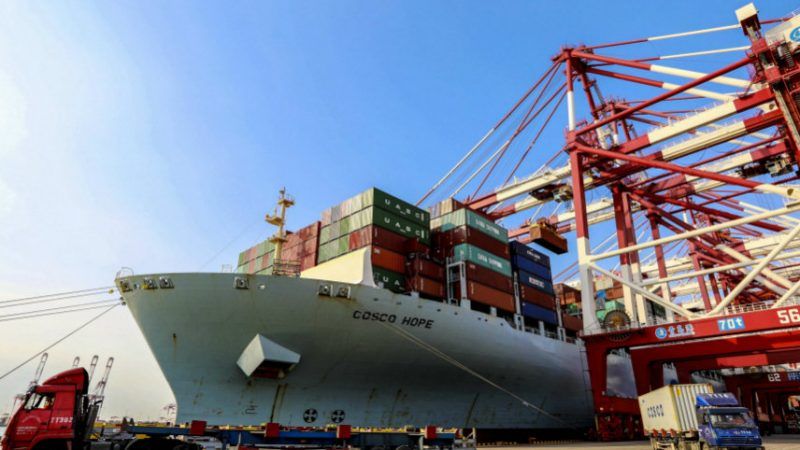'Tariffs Are the Greatest,' Trump Proclaims, as White House Begins Subsidizing Farmers Harmed by Tariffs
Tariffs are so great that we have to create new government programs to compensate the victims of tariffs.

President Donald Trump's proclamation that trade wars are "good and easy to win" now has competition for the honor of being the most ridiculous thing America's protectionist-in-chief has said about his anti-trade policies. This morning he dropped this whopper:
Tariffs are the greatest! Either a country which has treated the United States unfairly on Trade negotiates a fair deal, or it gets hit with Tariffs. It's as simple as that - and everybody's talking! Remember, we are the "piggy bank" that's being robbed. All will be Great!
— Donald J. Trump (@realDonaldTrump) July 24, 2018
The kicker to the tweet came a few hours later, when The Washington Post reported that the White House was preparing to spend $12 billion to subsidize farmers stung by tariffs. The funds will be available around Labor Day, according to the Post.
To sum up: Tariffs are so great that the federal government has to create new spending programs to compensate the tariffs' victims. If you think that doesn't make sense, you must not be sufficiently committed to making America great again.
More seriously, this is further proof that Trump's argument for trade barriers is completely unraveling. The White House has never made much of an effort to outline exactly how these tariffs would improve America's relationships with the affected trading partners, even as analysis after analysis suggests the policy would do exactly what it has done: hike prices and threaten jobs, with manufacturing and farming hardest hit.
As those consequences move from the theoretical to the practical, the White House has stubbornly refused to recognize the problem. Commerce Secretary Wilbur Ross has said job losses triggered by tariff are mere "hiccups along the way." The way to what, exactly, remains unclear. While some members of Congress have tried to rally support for legislation that would limit Trump's ability to damage the economy with more tariffs, others, such as Sen. Lindsey Graham (R–S.C.), have shrugged their shoulders and told Americans to get ready for a little pain before we win the trade war.
But dismissing the consequences of tariffs becomes more difficult—or at least requires a higher degree of cognitive dissonance—when you are simultaneously subsidizing people because they were hurt by the tariffs. How many mere hiccups require a $12 billion program to abate their effects?
It's wrong to view these subsidies solely as an economic program. They are probably better thought of as a public relations campaign. "White House officials hope it will quiet some of the unease from farm groups," the Post reports. Indeed, farmers (and Republican lawmakers from farming states) have been some of the loudest critics of Trump's trade polices. But throwing other peoples' money at interest groups to stop their complaining won't solve the fundamental problems created by Trump's trade war.
The price of soy beans, for example, has tumbled to a 10-year low as China puts a retaliatory tariff on American soy bean exports. Producers in other parts of the world have happily stepped into the opening created by the trade war. So China still gets its soy beans, while American farmers are left with an oversupply that can't find a market.
Trump's steel tariffs have driven up the cost of raw steel by 25 percent, leaving a slew of down-the-supply-chain businesses with higher overhead costs. Some have responded by canceling expansion plans, laying off workers, or threatening to move overseas. Some, including America's largest maker of steel nails, might go out of business entirely. Are you tired of winning yet?
The Trump administration's response to those troubles has been the same as its new policy of bailing out farmers: more government.
More than 1,200 businesses have filed over 20,000 requests for exemptions from the Trump administration's steel tariffs. The Commerce Department is sorting through them, one by one, deciding which companies get a special favor from the government and which have to deal with an unexpected new tax that might force layoffs or, worse, destroy entire businesses. Not only is the exemption process a bureaucratic nightmare, but it is ripe for cronyism. As CNN reported last month, large companies such as U.S. Steel are actively trying to block many exemption requests made by smaller business—because, of course, U.S. Steel is better able to absorb the added cost of tariffs than, say, a small metal fabrication business with 20 employees.
There's no reason to think that this newest White House program will be any different. The subsidies will flow to the farms that already have enough access to be first in line. The rest? Too bad.
Far from being "good and easy to win," the administration's determination to pursue protectionist economic policies requires ever more government intervention into the economy. More could be on the way. Ross has announced plans to investigate whether American businesses might be unfairly profiting off the White House's decision to slap tariffs on imported steel and aluminum.
Trump seems to think tariffs will succeed through sheer force. His administration will keep trying to pull the right levers, enforce the right penalties, and hand out the right subsidies until it finds a mix of those policies that work. This trust in central planning, all in pursuit of a goal that remains completely unclear, is sheer madness.


Show Comments (75)